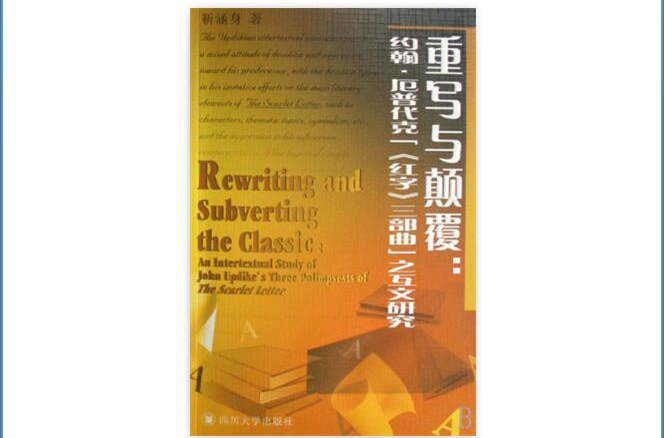《重寫與顛覆:約翰·厄普代克紅字三部曲之互文研究》是一本由四川大學出版社在2008年出版的書籍,其作者是靳涵身。
基本介紹
- 書名:重寫與顛覆:約翰·厄普代克紅字三部曲之互文研究
- 作者:靳涵身
- ISBN:9787561440056
- 頁數:239頁
- 出版社:四川大學出版社
- 開本:32開
- 尺寸: :20 x 13.8 x 1.2 cm
圖書信息,《紅字》作者簡介,內容簡介,目錄,
圖書信息
出版社: 四川大學出版社; 第1版 (2008年4月1日)
平裝: 239頁
正文語種: 簡體中文, 英語
開本: 32
ISBN: 9787561440056
條形碼: 9787561440056
尺寸: 20 x 13.8 x 1.2 cm
重量: 222 g
《紅字》作者簡介
約翰·厄普代克是美國當代著名小說家、文論家、詩人,不僅成果纍纍,且文采熠熠,幾乎攬獲美國所有的文學大獎,被譽為世界最佳英語小說家之一。
內容簡介
《重寫與顛覆:約翰·厄普代克紅字三部曲之互文研究》主要內容:約翰·厄普代克是美國當代著名小說家、文論家、詩人,不僅成果纍纍,且文采熠熠,幾乎攬獲美國所有的文學大獎,被譽為世界最佳英語小說家之一。其文壇地位祓認為與霍桑和納博科夫等大師齊名。《重寫與顛覆:約翰·厄普代克紅字三部曲之互文研究》研究的對象是厄普代克“《紅字》三部曲”——《整月都是禮拜天》(1975)、《羅傑教授的版本》(1986)、《S.》(1988)與霍桑《紅字》(1850)之間的互文關係。其主要任務是:(1)考證二者之間的互文事實;(2)梳理厄普代克互文小說的創作方法;(3)品評其互文藝術的特點;(4)甄別其世界觀在這幾部作品中的體現;(5)提高對美國社會文化的認識。
目錄
Introduction
Chapter 1 Intertextuality and Its Critical Approaches
1.1 The Theory of Intertextuality
1.2 Critical Approaches for Intertextual Investigation
Chapter 2 Imitative Intertextuality: The Prototypal Elements
2.1 Archetypal Projections in the Myth of Eden: The Shared Prototypes
2.1.1 Archetypal Projections in the Myth of Eden
2.1.2 Prototypes from the Myth of Eden for The Scarlet Letter
2.1.3 Direct Connections of Updike's Trilogy with the Myth of Eden
2.2 Prototypes for Updike's Trilogy Deriving from The Scarlet Letter
2.2.1 The Prototypal Characters
2.2.2 The Thematic Prototypes
2.2.3 The Symbolic Prototypes
Chapter 3 Derivative Intertextuality: The Extended Elements
3.1 Revelation of Unpublicized Details
3.2 Exposure of Characters behind the Scenes
3.3 Segmentation of Characters
3.4 Prequel/Sequel Scenarios
3.5 Paratextual Intertextuality
Chapter 4 Subversive Intertextuality: The Aggressive Elements
4.1 The Common Topics
4.2 Hawthorne's Attitudes and Opinions
4.3 Updike's Attitudes: Agreements and Subversions
4.3.1 The Agreed Elements
4.3.2 The Subverted Elements
Chapter 5 The Updikian Intertextual Narration: An Assessment
5.1 Rewriting Classics: A Specialty of Updike
5.2 The Updikian Intertextual Narration: Aesthetic Concerns
5.3 Updike's Voice: Thematic Concerns
5.3.1 Sex and Adultery
5.3.2 Religious Matters
5.3.3 Women's Liberation
Conclusion
Notes
Works Cited

